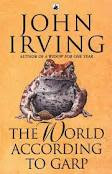
Sometimes you begin a novel and immediately feel comfortable. You know right away that this novelist understands the importance of plot, of interesting characters, of climax and resolution. For some readers, this will mark him out as a second rate. Some readers, clearly on a different intellectual plane to mine, feel that the truly quality novel should require more effort to read than it took to write – that is, be plotless and boring.
THE WORLD ACCORDING TO GARP has plot galore. It begins before Garp’s birth and follows him through childhood to his career as a successful writer, to his murder at the hands of extreme feminists. It’s absorbing from the first page. Occasionally Garp’s short stories are inserted in the text, which usually is for me – like dreams – something to be skipped. However so able is Irving as a writer that he manages to mix these fictional fictions with his fiction and still keep the arc going. Amazing.
An important theme of this novel is the impact of feminism on American society. One realizes, when seeing how hard Irving has to work to engage with feminism, how central the oppression of women was to the functioning of that society. It’s hard to understand now, from our perspective, all this agonizing; and it’s an interesting counterpoint to the last book I read, Simone de Beauvoir’s MEMOIRS OF A DUTIFUL DAUGHTER, which is about the very birth of feminism.
Garp, in a typical male-author-of-the-70s kind of way, is happy in his marriage but still has a bunch of stupid and mildly gross affairs (babysitters etc). This is not a very successful part of the novel. I think that certain experiences of certain demographics should be considered as having been entirely described. Certain authors have entirely covered certain areas in detail, and should be considered as owning those areas. Eg: unemployed families in the Midwest during the Great Depression (Steinbeck; childhood in France at the end of the nineteenth century (Proust – take note de Beauvoir). Unfortunately, adulterous men in late twentieth century America is John Updike, not John Irving, I’m afraid.
